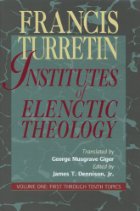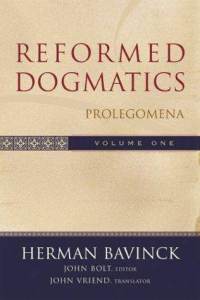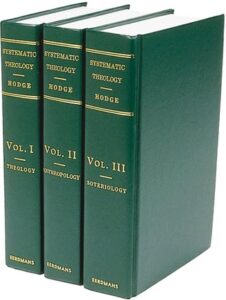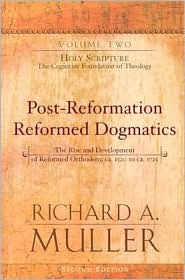Earlier there was quite a bit of discussion about whether Keith Mathison’s Shape of Sola Scriptura was the best there is on sola scriptura. In an e-mail Keith told me that he didn’t consider his book the best on the subject. He then listed several books and authors that give a more in-depth treatment on sola scriptura. Some of the titles he lists date back to the seventeenth century but are available in reprints or CD-rom format. Others are more current and available at most bookstores.
I would like to thank Keith bringing these titles to my attention. If any you are familiar with these books your comments are most welcome, especially if they relate to the subject of sola scriptura which has elicited such a lively discussion by many.
I wish to reassure my readers that I’m hard at work on my next posting: Where Does Sola Scriptura Come From? I hope to have it up soon.






I think Keith Mathison was being modest, but it is interesting to see what he recommends.
Goode, Whitaker, and Turretin are the best three of that set, from what I’ve seen. Also excellent is David King and William Webster’s triology, “Holy Scripture: the Ground and Pillar of our Faith.” I’d recommend that triology (especially the first volume) over Muller, Hodge, and Bavinck.
Me too Fr. Whiteford. While these books have many great sections in them and are very useful in many respects, I do not recall any of them coming close to dealing with the specific issues per Sola Scriptura as pointedly or as broadly as Mathison does in his book. Besides, as far as I understand the issues, they all suffer from a focus on Rome’s view of Tradition that contrasts sharply from Orthodoxy’s. Perhaps Mathison will revise his book in a few years to answer many of the objections in Roberts’ review?
Muller’s book explicates the Reformed position nicely, but I haven’t yet seen it’s specific interaction with specific EO arguments, so I am not entirely sure if it’s the best on the subject.
Whitaker’s is rightly popular, but there are many critiques of it (of varying quality).
Bavinck shows some ambiguity between modern Rome and the medievals, but…
King and Webster aren’t worth the money. Their works are not peer reviewed and neither of them have any significant academic training that I know of, and it shows. Whitaker and Goode are classic texts and worth readig for their historical value. Turretin for summation mostly.
Since when are polemical treatises “peer reviewed”? You have to wonder about someone who talks as though that were the standard. Are any of the books on this list “peer reviewed”?
For what it’s worth, King and Webster’s trilogy has received glowing endorsements from the Reformed camp. They do take flak from a variety of folks outside the Reformed camp (folks like Mr. Robinson, who talk as though they think that polemical books have to be written by college professors to be worth reading) but if you want a Reformed suggestion for a book that presents the Reformed position — and I suppose you do — there you have it.
-TurretinFan
TF,
Since for decades. Muller’s work is peer reviewed since it is a modernwork. The others aren’t since they came about prior to the standardization of peer review.
Glowing endorsements are cheap to come by and people have an interest, either financial or theological to endorse materail that supports their case. Endoresments are no substitute for the blind review process.
Material doesn’t need to be published by university profs to be worth reading, but peer review is a relaible way to weed out poor reasoning and sloppy research. While it is true that sometimes someone outside of the process can produce something worthwhile, the proess makes fidning the truth much more probable and easier. It is far better than the process of getting ons’ “Ph.D.” from a one room diploma mill.
But by all means, use King and Webster, and you’ll be setting yourself up to get nailed by sharp opponants who have read it too and can see its argumentative and evidential weakenesses.
Can you back up your claim regarding Muller’s work? Who submitted Muller’s Post-Reformation Reformed Dogmatics to peer review? Are you under the impression that everything put out by the Baker Publishing Group is peer-reviewed? Or has it dawned on you (yet) that peer-review is primarily a gate-keeper in the area of journals?
TF,
You are right to be suspicious of academic culture. I for one have been burned horribly by it (RTS.edu at Jackson, MS). Never mind that many academics are fifth column Marxists in the North.
However, academic and peer-review literature *does* weed out sloppy thinking. And glowing endorsements get old after a while. J. I. Packer has endorsed every book released by Eerdmans, Baker, and P & R in the last thirty years. It means less each time.
I really didn’t think Muller’s work would be up for debate. Few challenge his conclusions about the direction of Reformed post-scholasticism.
Peer-review is a great thing. No doubt about it. On the other hand, “peer review” is primarily for journals, especially scientific journals. I’m just challenging Mr. Robinson’s use of “peer review” as the standard for polemical treatises. I suspect he did not speak the truth in saying that Muller’s work was subject to peer review, and I suspect that was an error in ignorance, because he doesn’t understand the publishing process.
However, I am open to letting him defend himself and show his evidence. After all, it could be that it is *me* who is ignorant of Baker Publishing Group’s practices with respect to publishing historical and theological works. If he has evidence either that BPG always subjects such books to peer review or that BPG subjected Muller’s book in particular to peer review, I’m all ears.
Incidentally, I don’t think that the absence of peer review of Muller’s work means anything (except that Mr. Robinson is ignorant of the reality of the publishing process). Whether or not Muller’s work has merit doesn’t depend on whether it was peer-reviewed.
I agree that some people’s endorsements seem to be too freely given, and consequently lose much of their oomph. Nevertheless, endorsements (not peer review panels) seem typically to be the credibility currency for works of theology, whether or not that ought to be the case.
-TurretinFan
Uhm, actually peer review is also primarily used in scholarly works. Major academic publishers employ it regularly such as Oxford, Blackwell, et al.
From my knowledge Baker Academic uses peer review process for its publications, which is why they have a review board. Of course even if this weren’t the case, Muller’s work isn’t polemical but historical. And Muller has an earned doctorate and has published in peer reviewed venues. This is hardly the case for White, Webster or King. Last I checked Baker requires this.
And I’ve gone through the publishing process, though not for a book. But in any case, I’ve known plenty of academics who have as their pre-publication material that was being peer reviewed comprised part of our seminar reading. Of course, I am not sure if TF has actually gone through graduate school to know what is common practice or not to know these things. 🙂
So, nothing except your own say so to back up your claim – got it.
TF,
Uhm, look at the Baker Academic website for submissions. I guess Baker is now channeling me.
Got it.
Of course even if it were just my “say so”, this is predicated on real experience in academia in a relevant field. Have you gone through graduate school in a well recognized and accredited school and through the professional publicaiton process with a well recognized academic publisher?
Their submission policy states:
And there is a more detailed submission policy for Baker Academic specifically:
Is there some third page where it mentions that the submissions will be subjected to peer review? Or are you just waving your hands?
Perhaps, but endorsements in the Reformed world usually work for…Reformed people. That’s to be expected and I don’t fault them for that. Everyone lives in a community and even scholars act like seventh grade girls in cliques. That said, J.I. Packer recommending an RC Sproul book is impressive only to the people within that community.
Agreed Baroque Norseman. It might also be useful information for someone who wants to know what the community views as significant to the community.
If you can refute Whitaker’s work you will turn the world upside down. That is the book man. That is the Magnum Opus of Protestantism on the issue of Scripture. That book refuted Robert Bellarmine’s works. It’s never been refuted. Just read that man. I don’t know of any Protestant Scholar that would dismiss a refutation of that book.